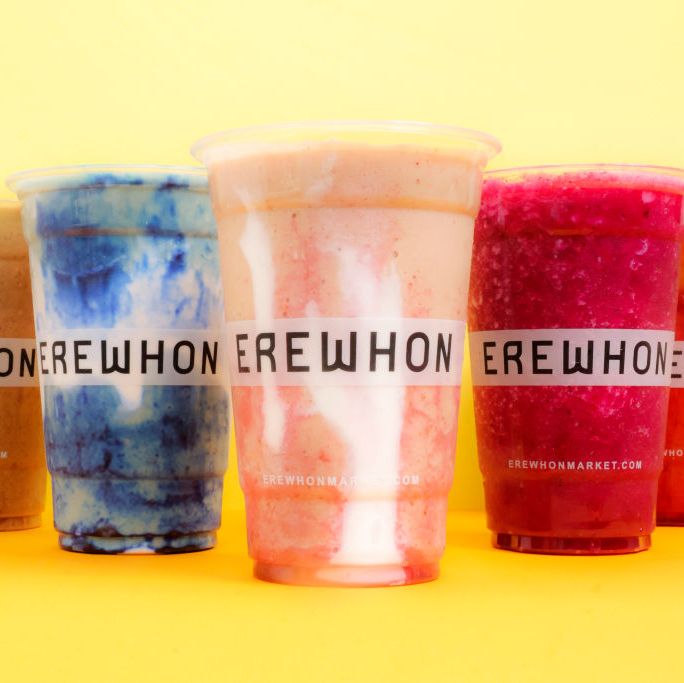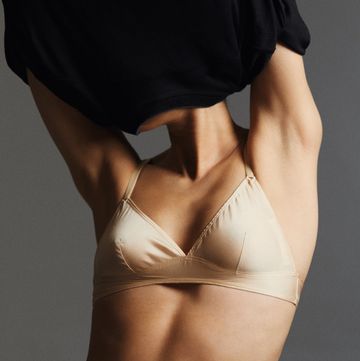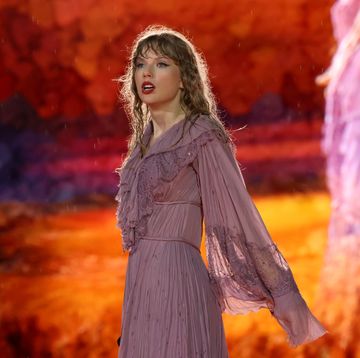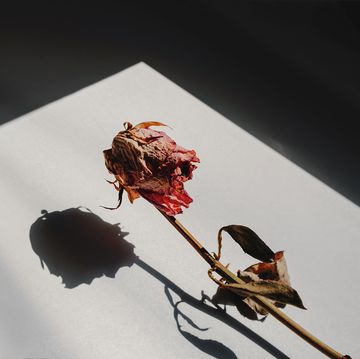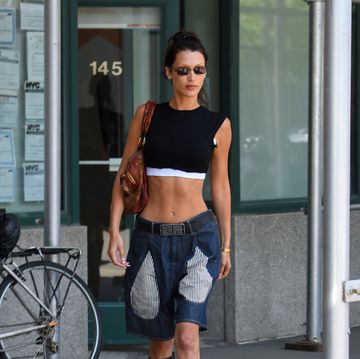You might have heard of Erewhon. You might even know how to pronounce it (if so, please advise us). But whether you’re well-versed in the ways of LA’s most hyped chain of grocery stores or are yet to be acquainted with its viral success, there’s no denying that this certified organic retailer is unlike any other food shop in the world.
Erewhon is a place where you can pick up a loaf of bread (marbled sourdough, approximately £12) and a pint of milk (raw cow’s milk, around £15), yes, but it’s also a purveyor of pre-packaged macrobiotic salad, frozen camel milk and jars of cerulean-blue sea moss gel. Regular shoppers papped among its fastidiously curated shelves include Dakota Johnson, Miley Cyrus, Hailey Bieber, Sofia Richie-Grainge and pretty much all of the Kar-Jenners.
The New York Times once described it as ‘LA’s hottest hangout’, while The Hollywood Reporter dubbed it ‘Succession, With Smoothies’. It’s often trending on TikTok, or influencing pop culture, inspiring the fictional health food store in the second season of Netflix’s You, Anavrin (nirvana spelled backwards), where Joe Goldberg met Love Quinn. Increasingly, it feels as synonymous with LA as athleisure gear and year-round sunshine.
But what turned this health food store into a cultural phenomenon? Its origin story is suitably cult-coded. The name is an anagram of ‘nowhere’, inspired by the title of a health-focused satirical novel by Samuel Butler that was first published in 1872.
Its founders were Michio and Aveline Kushi, a Japanese couple who opened the first outpost in Boston back in 1966. They were both students of George Ohsawa, the founder of the modern macrobiotic movement, which advocates eating local, seasonal whole foods, avoiding things like meat and sugar. While the original store didn’t survive, a second, in California, did, evolving into the string of 10 located across LA.
Now, these Insta-genic stores are a mecca for A-listers, health food fanatics and intrigued everyday shoppers alike. Bolstered by pandemic closures (remember when the supermarket was the only place to get dressed up for?), it has become a place not just to shop, but to see and be seen. The stores are small, strategically placed in the most affluent areas, and painstakingly designed to create a sense of luxurious authenticity. Even the playlists for each outlet are put together by a local DJ.
FIND OUT MORE ON ELLE COLLECTIVE
This has had a significant commercial effect, as Morgan Holt, Chief Strategy Officer at Saffron Brand Consultants, explains. ‘Luring an affluent clientele with trendy and expensive groceries means that brands will fight to be seen on the shelves. And they should,’ he says. ‘Meanwhile, social content ramps up the sense of rarity and a “you have to be here” message that only a physical space can communicate.’ In monetary terms, all this amounts to an estimated annual revenue of around £150M]m, according to US evaluator Growjo.
On TikTok, Erewhon content is ubiquitous. There’s a growing trend for ‘guess the price’ videos in which shoppers predict the cost of everyday items. Pre-prepared vegetables are a favourite within this format, with humble (though organic) carrot sticks coming in at more than £18. Reviews of Erewhon hauls are also popular; ‘Trying the most expensive items from Erewhon’ or ‘Testing out $200 of Erewhon smoothies’ are among the most common captions.
While the social media content often seems to be satirising the exorbitant price tags and elitism of the store, its creators are, crucially, still shopping there – and generating further buzz as they do so. It all taps into what Gabriela Serpa Royo, senior cultural analyst at behavioural insights agency Canvas8, calls ‘affordable affluence’.
‘Erewhon’s popularity hinges on its affordability – and the irony of saying that about the most expensive supermarket in the world is not lost on me,’ she says. ‘The cost of living crisis is pushing Millennials and Gen Zs out of big purchases like buying homes, and spending on little luxuries is emerging as an antidote to that feeling of helplessness. It’s the lipstick effect, but with smoothies. Leaning into that treat culture can feel like an act of self-determination.’
Another crucial key to Erewhon’s success is its savvy celebrity collaborations. Model Winnie Harlow has become the latest star to create a drink with the store: a luminous layered ‘Island Glow Smoothie’, which costs around £17.50. Before Harlow, there were high-profile partnerships with Gisele Bündchen, Kourtney Kardashian and, perhaps most memorably, Bieber.
The model’s Strawberry Skin Glaze smoothie reportedly sold 40,000 units a month when it was on the menu. Along with strawberries, avocado and almond milk (so far, so Whole Foods) the 12-ingredient candyfloss pink concoction contained a ‘skin-supporting’ blend of hyaluronic acid, collagen and sea moss gel. It’s now available as a ‘soft serve’, and Bieber’s Instagram Reel introducing the new product attracted more than 20m views.
The products seem to embody Bieber’s personal brand, a consumable form of the kind of glow usually derived only from an elaborate skincare regime. That feels like an apt metaphor for Erewhon’s success; it grants access to the upper echelons of celebrity-endorsed wellness culture. ‘It offers not just products but an entire lifestyle that’s sexy, clean and aspirational,’ explains Layla Sanjoori, Cultural Strategist and Semiotician at Space Doctors. ‘This resonates with a consumer base seeking authenticity, quality and holistic wellbeing.’
Erewhon’s move to New York is often rumoured – and it follows that a London outpost wouldn’t be too far behind that. In fact, the trend for hyper-expensive food shops seems to be crossing the Atlantic already. In London, it’s evident in the form of Daylesford (which Christina Najjar, better known as @tinx, called ‘the Erewhon of London’) and Holland Park’s Supermarket of Dreams.
At the latter, amid the neon lights, trendy music and more than a few celebrities (the Beckhams are regulars), the quality of the groceries is sky-high, but so are the prices. When I popped in over the weekend, I found a Japanese crown melon that cost £95. Then I asked a staff member if they had any crispy chilli oil for sale, only to be told that most customers prefer to have their private chef make it for them at home. Seriously.
Did I come away with a little treat? Of course. Would I spend £20 on a smoothie? Not a chance in hell.
ELLE Collective is a new community of fashion, beauty and culture lovers. For access to exclusive content, events, inspiring advice from our Editors and industry experts, as well the opportunity to meet designers, thought-leaders and stylists, become a member today HERE.
